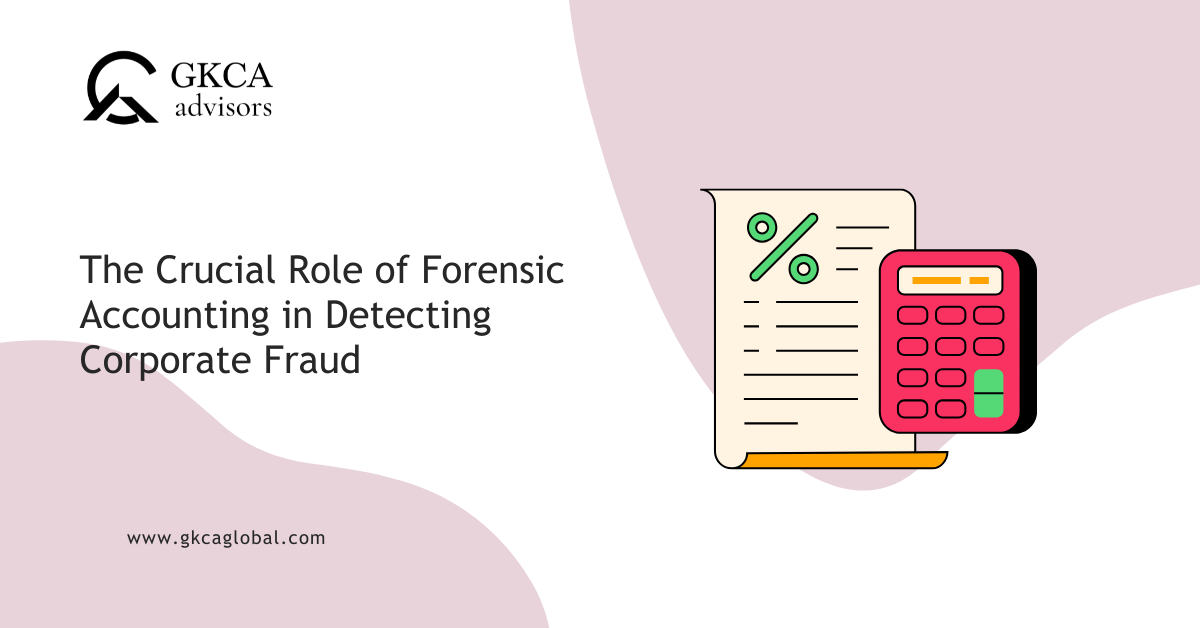Forensic accounting plays a vital role in detecting, investigating, and preventing corporate fraud across organizations. It combines accounting principles with investigative skills to uncover fraudulent activities, support legal action, and strengthen corporate governance. This article is worth reading because it explains how forensic accountants analyse complex financial data, perform forensic audits, and provide expert testimony in legal proceedings to combat financial crime effectively.

Outline
1. Understanding Forensic Accounting and Its Scope
2. The Role of a Forensic Accountant in Fraud Detection
3. How Forensic Accounting Combines Accounting and Investigation
4. The Importance of Forensic Audits in Organisations
5. Detecting Corporate Fraud Through Financial Analysis
6. Forensic Accounting in Corporate Governance
7. Using Risk Assessments for Fraud Prevention
8. Legal Proceedings and Expert Witness Testimony
9. Conducting Regular Audits and Detecting Financial Fraud
10. The Future of Forensic Accounting in Fraud Prevention
Understanding Forensic Accounting and Its Scope
Forensic accounting is a specialised field that combines accounting principles and investigative techniques to detect and prevent fraud. Accounting professionals utilise advanced data analytics to examine financial records and reveal anomalies that may indicate fraudulent activity. Forensic accountants play a crucial role in financial investigations, enabling organisations to uncover inconsistencies across transactions and maintain integrity in financial statements.
The scope of forensic accounting extends beyond corporate fraud to include embezzlement, money laundering, bribery, securities fraud, and misappropriation of assets. A forensic accountant’s work can uncover manipulations in financial data, asset diversion, or any irregularity leading to financial misconduct. This investigation process demands a comprehensive understanding of laws and regulations governing financial records, enabling specialists to detect suspicious behaviour early on.
Forensic accounting services are essential for both private companies and regulatory bodies. They help identify fraudulent activities hidden in complex financial structures, ensure organisations comply with regulatory frameworks, and preserve trust among stakeholders. By conducting forensic accounting analyses, firms can detect and prevent fraudulent transactions before they escalate.
The Role of a Forensic Accountant in Fraud Detection
A forensic accountant acts as an investigator, analyst, and financial expert. Their primary goal is to detect and document fraud by scrutinising financial information for anomalies or inconsistencies. They meticulously analyse financial data, examine financial records, and trace transactions to uncover fraudulent behaviour within an organisation’s accounting practices.
Forensic accountants utilise various techniques such as ratio analysis, examination of financial statements, and assessment of internal controls to detect fraud. Their role often extends into litigation, where they provide expert testimony, support legal cases, and present crucial evidence derived from detailed forensic audits. This combination of investigative and accounting skills positions them as key professionals in corporate fraud detection.
The forensic accountant also assists audit teams in assessing the effectiveness of internal accounting processes. They evaluate whether financial statements reflect true and fair views of the organisation’s operations and identify areas vulnerable to fraud risk. Their analytical techniques contribute to fraud prevention and financial transparency.
How Forensic Accounting Combines Accounting and Investigation
Forensic accounting combines accounting principles and investigative skills to detect and prevent fraudulent activities. Traditional accounting focuses on recording and reporting, while forensic accounting goes beyond to uncover manipulated financial data and reveal wrongdoing. The forensic accountant applies analytical techniques and advanced data analytics to trace irregularities in financial transactions.
During a financial investigation, the forensic accountant assesses relevant financial statements, identifies anomalies, and conducts an assessment to understand the scope of potential fraud. These investigations may lead to legal proceedings or support regulatory bodies taking corrective action. The process also includes risk assessments and fraud detection strategies to strengthen the organisation’s financial integrity.
This hybrid approach ensures that every forensic audit incorporates both accounting accuracy and investigative scrutiny. Forensic accounting helps detect fraud early, reduce economic damages, and restore confidence in corporate governance.
The Importance of Forensic Audits in Organisations
A forensic audit plays a crucial role in uncovering irregularities in financial statements and investigating financial fraud. Unlike traditional audits, which verify compliance and accuracy, forensic audits specifically aim to detect fraudulent transactions and financial misconduct. Organisations rely on forensic accounting to identify inconsistencies that could indicate potential fraud risk.
Forensic accountants conducting a forensic audit follow a structured investigation process, including reviewing financial records, identifying inconsistencies, and utilising analytics to detect fraud patterns. Such audits are indispensable tools for examining suspected fraud or financial irregularity within an organisation’s accounting practices.
Conducting regular forensic audits allows companies to prevent fraudulent activities, maintain accountability, and demonstrate transparency to shareholders and regulatory bodies. These audits help uncover corporate fraud and establish a culture of compliance and ethical conduct.
Detecting Corporate Fraud Through Financial Analysis
Corporate fraud often involves complex schemes to manipulate financial information or conceal transactions. Detecting such fraud requires forensic accounting techniques and detailed analysis of financial data. The forensic accountant uses analytical tools, including financial ratios and transaction tracing, to uncover suspected fraud and identify patterns hidden in complex financial data.
Financial analysis is integral to identifying fraudulent activities in cases of financial misconduct. The forensic accountant must scrutinise all documents, conduct detailed examinations of financial records, and identify anomalies that suggest fraud or misappropriation. Analysing financial statements can reveal manipulated financial transactions or embezzlement.
Forensic accounting in corporate environments plays a crucial role in maintaining the credibility of financial reports. It assists in identifying financial scams, preventing future frauds, and protecting shareholders from economic damages due to financial mismanagement.
Forensic Accounting in Corporate Governance
Forensic accounting contributes significantly to strong corporate governance by ensuring transparency, ethical operation, and compliance with laws and regulations. Effective corporate governance demands the presence of mechanisms like forensic audits and fraud detection processes that identify and prevent fraudulent behaviour.
By employing forensic accounting techniques, organisations can uncover irregularities before they become severe. This proactive approach fortifies governance frameworks and ensures adherence to accounting principles. The role of forensic accountants in corporate governance includes detecting fraud early, analysing financial statements for inconsistency, and supporting the development of ethical business practices.
Robust forensic accounting systems prevent fraudulent activities, minimise reputational risk, and support regulatory compliance. They enable organisations to sustain long-term growth and maintain trust with stakeholders and investors.
Using Risk Assessments for Fraud Prevention
Risk assessments are crucial for identifying potential vulnerabilities that may lead to fraud. Forensic accounting incorporates comprehensive risk assessments to evaluate control systems and detect weaknesses that fraudsters could exploit. This proactive approach is fundamental to fraud prevention and overall organisational health.
A forensic accountant performs risk assessments regularly to ensure accounting processes are resilient and transparent. They identify red flags such as inconsistency in financial transactions, inflated revenues, or expense manipulation. These indicators are analysed to detect and prevent fraud before legal action is required.
Implementing risk assessments as part of forensic accounting practices helps organisations detect and prevent fraudulent behaviour, sustain good governance, and demonstrate accountability. It is a vital part of ensuring ongoing financial health and preventing financial misconduct.
Legal Proceedings and Expert Witness Testimony
Forensic accountants play a crucial role during legal proceedings by providing expert testimony. Their findings support legal cases involving fraud, financial crime, and misappropriation. Forensic accountants gather and interpret crucial evidence during their investigation process, helping courts understand complex financial issues.
Expert testimony provided by forensic accountants often includes explanations of analytical techniques used, documentation of financial records examined, and interpretation of anomalies found. They can provide expert testimony in cases involving financial fraud, embezzlement, or securities fraud, ensuring justice through reliable financial insights.
Forensic accountants’ work supports legal proceedings by illustrating financial irregularities and recommending safeguards to prevent fraudulent behaviour in the future. Their ability to interpret financial information and provide expert evidence makes them indispensable in litigation related to financial crimes.
Conducting Regular Audits and Detecting Financial Fraud
Conducting regular audits is essential for identifying irregularities, preventing fraudulent activities, and maintaining strong corporate governance. A forensic accountant specialising in fraud prevention plays a vital role in this process by analysing financial data, reviewing internal controls, and identifying signs of fraudulent practices.
Regular forensic accounting investigations help detect fraud and maintain compliance with laws and regulations. Through continuous monitoring, organisations can report suspicious activities early, uncover potential inconsistencies, and prevent future fraud. This discipline combines accounting precision with investigation to identify fraudulent transactions before they escalate.
Routine forensic audits and financial assessments equip companies to remain vigilant against evolving forms of corporate fraud. Conducting regular evaluations of financial records also reinforces accountability and operational transparency within organisations.
The Future of Forensic Accounting in Fraud Prevention
The future of forensic accounting lies in its expanding role in fraud detection, prevention, and litigation support. With the rise of complex financial transactions and digital records, forensic accountants are increasingly utilising advanced data analytics tools to identify patterns that suggest fraudulent activities.
As businesses grow and financial systems evolve, forensic accounting will continue to play a crucial role in corporate fraud prevention. From financial fraud investigations to corporate governance enhancement, forensic accountants will remain key players in maintaining ethical and transparent organisations.
The ongoing development of forensic accounting practices will strengthen compliance, mitigate financial misconduct, and promote trust between companies, investors, and regulatory bodies. Forensic accountants will continue to evolve their methods to address the growing sophistication of global financial crimes.
Key Takeaways
- Forensic accounting combines accounting and investigation to detect and prevent fraud.
- Forensic accountants play a vital role in uncovering fraudulent activities and supporting legal proceedings.
- Forensic audits identify irregularities in financial records and ensure compliance.
- Strong corporate governance relies on timely fraud detection and transparent accounting practices.
- Risk assessments are crucial for identifying vulnerabilities and preventing fraudulent behaviour.
- Expert witness testimony from forensic accountants is essential in financial crime litigation.
- Conducting regular audits strengthens fraud prevention and ensures ethical operations.
- Forensic accounting continues to evolve with technology and advanced data analytics for improved fraud detection.
